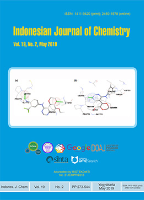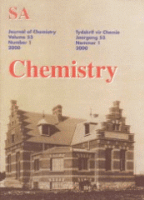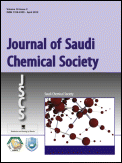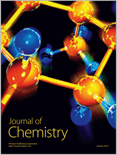
Indonesian Journal of Chemistry
Scope & Guideline
Connecting Minds: A Platform for Global Chemical Discourse
Introduction
Aims and Scopes
- Synthesis and Characterization of Chemical Compounds:
The journal features numerous studies on the synthesis and characterization of novel chemical compounds, including metal complexes, organic compounds, and nanomaterials, highlighting their structural and functional properties. - Environmental Chemistry and Waste Management:
A significant emphasis is placed on environmental chemistry, particularly the development of methods for the removal of pollutants, heavy metals, and dyes from wastewater, as well as studies on the environmental impact of chemical processes. - Biochemistry and Medicinal Chemistry:
Research articles often explore the biochemical properties of compounds, including their potential medicinal applications, such as anticancer, antibacterial, and antioxidant activities, often supported by molecular docking studies. - Nanotechnology and Material Science:
The journal covers advancements in nanotechnology, focusing on the synthesis, characterization, and application of nanomaterials in various fields, including catalysis, drug delivery, and energy storage. - Analytical Chemistry:
It includes methodologies for the analysis of chemical substances, including spectroscopic, chromatographic, and electrochemical techniques, aimed at enhancing sensitivity and specificity in various applications. - Green Chemistry and Sustainable Practices:
The journal promotes research that aligns with green chemistry principles, emphasizing sustainable practices in chemical synthesis and analysis, including the use of renewable resources and environmentally friendly methodologies.
Trending and Emerging
- Sustainable and Green Chemistry:
An increasing number of publications focus on sustainable practices, including green synthesis methods, waste valorization, and the development of environmentally friendly materials and processes. - Nanomaterials and Their Applications:
Research on nanomaterials, particularly their synthesis and applications in catalysis, drug delivery, and environmental remediation, is trending, reflecting the growing interest in nanotechnology. - Biological and Medicinal Applications of Chemistry:
There is a notable increase in studies exploring the biochemical and medicinal properties of natural products and synthetic compounds, particularly in anticancer and antimicrobial research. - Advanced Analytical Techniques:
Emerging trends include the development and application of advanced analytical techniques for chemical analysis, including miniaturized and rapid methods for detecting pollutants and toxins. - Computational Chemistry and Molecular Modeling:
The use of computational methods for predicting the behavior of chemical compounds and their interactions is on the rise, with more studies integrating molecular docking and dynamics simulations.
Declining or Waning
- Traditional Organic Synthesis:
There is a noticeable decline in the number of publications focused solely on classical organic synthesis methods, as researchers increasingly look toward more innovative and sustainable approaches. - Inorganic Chemistry without Application Context:
Papers that primarily discuss inorganic chemistry topics without clear applications or relevance to current challenges are becoming less frequent, indicating a preference for research that connects to practical applications. - Basic Theoretical Studies:
While foundational theoretical studies are still important, there is a decreasing trend in the publication of purely theoretical papers that do not relate to experimental validation or real-world applications.
Similar Journals

DOKLADY CHEMISTRY
Bridging theory and practice in the world of chemistry.DOKLADY CHEMISTRY is an esteemed academic journal published by MAIK NAUKA/INTERPERIODICA/SPRINGER, focusing on the dynamic field of chemistry. Established in 1996, this journal serves as a significant platform for disseminating cutting-edge research, reviews, and significant developments in various areas of chemistry, including but not limited to general and miscellaneous chemistry. Currently indexed with an ISSN of 0012-5008 and E-ISSN of 1608-3113, DOKLADY CHEMISTRY maintains a commitment to academic rigor and integrity, contributing critical insights to the scientific community. Despite its Q4 ranking in the 2023 Chemistry category and a Scopus rank of #314 out of 408, this journal remains an important resource for researchers, professionals, and students eager to explore emerging trends and innovative methodologies in the field. The journal operates under a model that supports comprehensive scholarly communication, making it a key fixture among established chemistry publications.

RUSSIAN JOURNAL OF GENERAL CHEMISTRY
Advancing the Frontiers of General ChemistryThe Russian Journal of General Chemistry is a prominent scholarly publication dedicated to advancing the field of general chemistry. Published by MAIK NAUKA/INTERPERIODICA/SPRINGER, this journal contributes significantly to the global chemistry landscape, offering a platform for researchers and professionals to share their latest findings and methodologies. With an ISSN of 1070-3632 and an E-ISSN of 1608-3350, it has established itself as a resource for high-quality research articles since its inception in 1996. Though currently indexed in the Q4 category for chemistry (miscellaneous) and ranking #299 out of 408 in general chemistry according to Scopus, the journal remains an important venue for academic contributions that bridge gaps in traditional chemical disciplines. Desiring to cater to a diverse range of interests within chemistry, the journal actively encourages submissions that reflect significant scientific achievements, innovations, and collaborative studies. Although the journal does not currently offer open access, its role in disseminating crucial chemical research cannot be overstated. Researchers and students alike will find valuable insights and rigorous scientific discourse in its pages.

Bulletin of the University of Karaganda-Chemistry
Advancing Chemistry Knowledge for Tomorrow's InnovatorsBulletin of the University of Karaganda-Chemistry is an esteemed academic journal published by KARAGANDA STATE UNIVERSITY, focusing on the field of chemistry and related disciplines. With an ISSN of 2518-718X and an E-ISSN of 2663-4872, this journal aims to disseminate high-quality research articles, reviews, and scholarly discussions that contribute to the advancement of knowledge in chemistry. Although it has experienced a transition in its coverage from 2021 to 2022, the journal remains a significant platform for researchers and students alike, promoting open access to its valuable content. Despite its current Scopus rank of #379/407 in the general chemistry category, the Bulletin of the University of Karaganda-Chemistry serves as a vital resource for the academic community in Kazakhstan and beyond, fostering collaboration and innovation in various chemical research domains. Researchers, professionals, and students are encouraged to engage with the journal as it continues to evolve and contribute to significant scientific discussions.

Journal of Chemistry and Technologies
Advancing Chemistry, Inspiring Innovation.The Journal of Chemistry and Technologies, published by OLES HONCHAR DNIPROPETROVSK NATIONAL UNIVERSITY, is an open access journal dedicated to advancing knowledge in the broad fields of chemistry and chemical engineering since its inception in 2013. With ISSN 2663-2934 and E-ISSN 2663-2942, this journal provides a vital platform for researchers and professionals, particularly in Ukraine and beyond, to share innovative research findings and contemporary technological advancements. Currently ranked in the Q4 quartile in both Chemical Engineering and General Chemistry for 2023, it serves as an enriching resource for those interested in emerging trends and interdisciplinary studies within these domains. The journal adheres to high academic standards while fostering collaboration in the scientific community by offering open access articles that ensure visibility and accessibility to a global audience. As an important part of the academic landscape, the Journal of Chemistry and Technologies aims to inspire future research and development, paving the way for new discoveries and applications in chemistry-related fields.

Moscow University Chemistry Bulletin
Connecting Researchers for a Brighter Chemical FutureMoscow University Chemistry Bulletin is a distinguished academic journal dedicated to advancing the field of chemistry, published by PLEIADES PUBLISHING INC. With an ISSN of 0027-1314 and an E-ISSN of 1935-0260, this journal provides a platform for researchers, professionals, and students to explore a wide range of topics in general and specialized chemistry. While it holds a current Q4 ranking in the “Chemistry (miscellaneous)” category according to Scopus, the journal is committed to broadening its scope and visibility, aiming for greater impact in the global scientific community. Moscow University Chemistry Bulletin focuses on the publication of cutting-edge research, reviews, and discussions that stimulate innovation and collaboration. Although it is not an Open Access journal, it plays a crucial role in disseminating knowledge and fostering academic dialogue within the field, as it converges towards significant findings from 2004 to 2024. The continuous development of its content holds the potential to attract a diverse readership, making it a valuable resource for those involved in the chemical sciences.

Canadian Journal of Chemistry
Fostering Interdisciplinary Discoveries in ChemistryWelcome to the Canadian Journal of Chemistry, a prominent publication dedicated to advancing the study of chemistry through original research and critical reviews. Published by Canadian Science Publishing, this journal has been a cornerstone of chemical research since its inception, covering a broad spectrum of topics within the field, including catalysis, organic chemistry, and general chemistry. With an ISSN of 0008-4042 and E-ISSN of 1480-3291, it provides a vital platform for researchers, professionals, and students to disseminate their findings and engage in scholarly discourse. Impact Factor is currently in development, with the journal classified in the Q4 category for catalysis and Q3 for miscellaneous chemistry fields, signifying its evolving contributions to the scientific community. The journal operates without an open access model, which ensures a rigorous peer-review process while maintaining subscription access for institutions and libraries. Located in Ottawa, Canada, the Canadian Journal of Chemistry continues to provide an invaluable resource for those dedicated to the scientific pursuit of chemistry, making significant strides in fostering interdisciplinary approaches and innovative research methodologies.

Physical Chemistry Research
Connecting researchers to innovate in physical chemistry.Physical Chemistry Research, published by the Iranian Chemical Society, is an esteemed academic journal dedicated to advancing knowledge within the fields of *Fluid Flow and Transfer Processes*, *Physical and Theoretical Chemistry*, and *Statistical and Nonlinear Physics*. Since its inception in 2013, the journal has established a crucial platform for researchers, professionals, and students to share innovative findings and methodologies, enhancing collaboration and knowledge dissemination in the physical chemistry community. With impactful contributions recognized in Quartile 3 and Quartile 4 classifications across various categories, the journal is positioned to cultivate emerging research trends as it continues to converge through 2024. Researchers can benefit from diverse perspectives on crucial phenomena in physical chemistry, as the journal is indexed in prominent databases, further increasing accessibility and visibility. The *open access* policy ensures that cutting-edge research remains available to a broad audience, promoting the growth of the discipline globally.

SOUTH AFRICAN JOURNAL OF CHEMISTRY-SUID-AFRIKAANSE TYDSKRIF VIR CHEMIE
Unleashing Potential: Chemistry Without BarriersSouth African Journal of Chemistry (Suid-Afrikaanse Tydskrif vir Chemie), published by Bureau Scientific Publications, is a pivotal open-access journal that has been disseminating groundbreaking research in the field of chemistry since its inception in 1996. With an ISSN of 0379-4350 and an E-ISSN of 1996-840X, this journal serves as a vital platform for researchers and professionals seeking to share their work and engage with the global chemistry community. Recognized for its significant contributions, the journal holds a Q3 quartile ranking in the miscellaneous chemistry category as of 2023 and ranks #216 out of 408 in General Chemistry according to Scopus. The South African Journal of Chemistry is dedicated to advancing knowledge in the discipline by publishing a wide array of articles, reviews, and studies that address pertinent chemical research and applications. With open access options available since 2000, it fosters a collaborative environment, ensuring that research is accessible to all, thereby enhancing the visibility and impact of chemists' work across South Africa and beyond.

Journal of Saudi Chemical Society
Empowering Chemists Through Open Access Innovation.The Journal of Saudi Chemical Society, published by ELSEVIER, stands as a premier platform for advancing knowledge in the field of chemistry. Since its inception in 2009, this Open Access journal has garnered significant attention, securing a prestigious Q1 ranking in the Chemistry (miscellaneous) category for 2023, reflecting its position among the top journals in the discipline. With an impressive Scopus ranking of #66 out of 408 in General Chemistry, this journal boasts a commendable 83rd percentile, underscoring its impact and relevance in the global research community. The journal aims to disseminate high-quality research articles, reviews, and case studies, fostering innovation and collaboration among chemists and allied professionals. By enabling widespread access to cutting-edge research, the Journal of Saudi Chemical Society plays a crucial role in supporting the educational and professional development of students, researchers, and practitioners alike, making it an essential resource for anyone invested in the dynamic field of chemistry.

Journal of Chemistry
Connecting Ideas, Driving Discovery in ChemistryJournal of Chemistry, published by Hindawi Ltd, serves as a critical platform for advancing knowledge in the field of chemistry, particularly in its miscellaneous sub-disciplines. With an impressive 2023 Scopus Rank of #123 out of 408 and positioned in the Q2 quartile, this journal exemplifies a robust academic rigor that appeals to researchers, professionals, and students alike. It features articles related to innovative chemical research and developments, catering to a diverse audience eager to contribute to the growing body of literature in the chemical sciences. The journal has been operational from 2013 to 2024, and its Open Access model ensures that findings are easily accessible to a global audience, fostering collaboration and knowledge sharing. With a commitment to quality and relevance, the Journal of Chemistry continues to play a significant role in shaping contemporary chemical research and education.